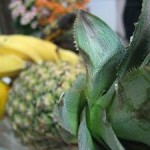 First, researchers from the University of Warwick developed a race car made from potatoes, carrots and chocolate.
First, researchers from the University of Warwick developed a race car made from potatoes, carrots and chocolate.
Now Brazilian scientists have found a way to turn fibers from pineapples, bananas, coconut shells and other plants into plastics that can be used in automobiles.
These fruits and plants contain cellulose, which can be processed into tiny nano fibers that reinforce plastics used in automotive manufacturing. In addition to its renewable nature, the material is extremely strong and lightweight, according to researcher Alcides Leão.
“The properties of these plastics are incredible,” Leão said in a statement. “They are light, but very strong — 30 percent lighter and three-to-four times stronger. We believe that a lot of car parts, including dashboards, bumpers, side panels, will be made of nano-sized fruit fibers in the future. For one thing, they will help reduce the weight of cars and that will improve fuel economy.”
Leão predicts the bio-plastics will be in use in the next two years because automakers are already experimenting and testing nano cellulose-reinforced plastics. The most promising feed stocks are pineapple leaves and stems, bananas, coconut shells, agave plants, cattails, and curaua and fique, two plants related to the pineapple.
The materials are processed in a device that is similar to a pressure cooker before being heated with special chemicals that turn the mixture into a fine powder. One pound of nano-cellulose fibers can reinforce 100 pounds of plastic.
The reinforced plastics may one day play a role in the medical industry, such as artificial heart valves and hip joints, according to Leão, who presented the findings at the American Chemical Society‘s Spring Meeting and Exposition. The event began Sunday and ends Thursday.
Read more: http://www.greenbiz.com/news/2011/03/30/greener-plastics-possible-bananas-pineapples#ixzz1JLAcnIiO






